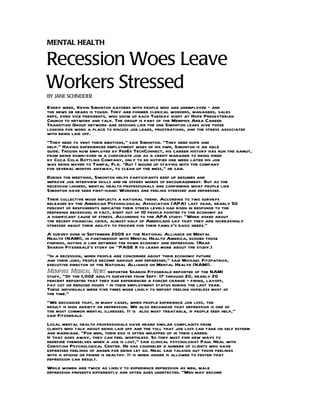
Hope CT Lead Article
- 1. MENTAL HEALTH Recession Woes Leave Workers Stressed BY JANE SCHNEIDER Every week, Kevin Simonton gathers with people who are unemployed — and the news he hears is tough. They are former clerical workers, managers, sales reps, even vice presidents, who show up each Tuesday night at Hope Presbyterian Church to network and talk. The group is part of the Memphis Area Career Transition Group network and sessions like the one Simonton leads give those looking for work a place to discuss job leads, frustrations, and the stress associated with being laid off. “They need to vent their emotions,” said Simonton. “They need hope and help.” Having experienced employment woes of his own, Simonton is an able guide. Though now employed by FedEx TechConnect, his career history has run the gamut, from being down-sized in a corporate job as a credit manager to being hired by Coca Cola Bottling Company, only to be notified one week later his job was being moved to Tampa, Fla. “But I wound up staying with the company for several months anyway, to clean up the mess,” he said. During the meetings, Simonton helps participants beef up resumes and improve job interview skills and he offers words of encouragement. But as the recession lingers, mental health professionals are confirming what people like Simonton have seen first-hand: Workers are feeling stressed and depressed. Their collective mood reflects a national trend. According to two surveys released by the American Psychological Association (APA) last year, nearly 50 percent of respondents indicated their stress levels had risen in response to the deepening recession; in fact, eight out of 10 people pointed to the economy as a significant cause of stress. According to the APA study: “When asked about the recent financial crisis, almost half of Americans say that they are increasingly stressed about their ability to provide for their family’s basic needs.” A survey done in September 2009 by the National Alliance on Mental Health (NAMI), in partnership with Mental Health America, echoed those findings, noting a link between the down economy and depression. (Read Sharon Fitzgerald’s story on **PAGE X to learn more about the study.) “In a recession, when people are concerned about their economic future and their jobs, people become anxious and depressed,” said Michael Fitzpatrick, executive director of the National Alliance on Mental Health (NAMI). Memphis Medical News reporter Sharon Fitzgerald reported of the NAMI study, “Of the 1,002 adults surveyed from Sept. 17 through 20, nearly 20 percent reported that they had experienced a forced change — firing, layoff, pay cut or reduced hours — in their employment status during the last year. These individuals were five times more likely to report feeling hopeless most of the time.” “We recognize that, in many cases, when people experience job loss, the result is high anxiety or depression. We also recognize that depression is one of the most common mental illnesses. It is also most treatable, if people seek help,” said Fitzgerald. Local mental health professionals have heard similar complaints from clients who talk about being laid off and the toll that job loss can take on self esteem and marriage. “For men, their ego is often wrapped up in their career. If that goes away, they can feel worthless. So they must find new ways to redefine themselves when a job is lost,” said clinical psychologist Paul Neal with Christian Psychological Center. He has counseled a number of clients who have expressed feelings of anger for being let go. Neal said talking out those feelings with a spouse or friend is healthy. It is when anger is allowed to fester that depression can result. While women are twice as likely to experience depression as men, male depression presents differently and often goes undetected. “Men may become
- 2. grouchy, irritable, and withdrawn, but it’s often not identified as depression by the guy who is going through it,” said Neal. “He instead blames it on his job loss, marriage, or family.” When a man gets laid off, he may also feel like he’s letting his family down when his income is decreased, particularly if it means the family is forced to make sacrifices. “It must be a shared sacrifice,” said Neal. In other words, family members must decide together how best to live within a diminished budget, whether that means giving up vacations, pulling children out of private school, or trading in a new car for something more affordable. “If the family can see the job loss as a shared sacrifice, then it’s not just Dad losing a job but the whole family doing without.” Finally, the stress of the recession is not limited to those who join the ranks of the unemployed. Employees who survive layoffs are left to manage heavier workloads and sometimes report feeling survivor guilt. Judy Bookman works as a licensed clinical social worker for Concern EAP, an employee assistance program that provides support and referral services for more than 100 companies across the Mid-South. She has held seminars for 12 companies who have had to terminate employees. “A lot of people talk about survivor guilt. If they were friends with their former colleagues, they feel guilty for having kept their job,” said Bookman. Employees are also staying in jobs they would have left during a stronger economy, noted psychologist Ed Wise with Mental Health Resources. “Many people in the past would leave a job when they got unhappy and dissatisfied, but now they have to stay in the job and learn how to cope with conditions they’re unhappy with. They wind up feeling trapped and hopeless in that job instead of strategizing new ways of reinventing themselves. Now, it’s how to cope with the circumstances they’re dissatisfied with.” From Memphis - West Tennessee Medical News